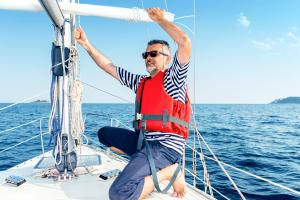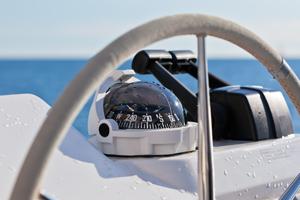What floats our boat? Safety.

Meet Dave. Like one in 10 Americans, he owns a boat. Dave and his family spend an average of 14 weekends on the water. Like 95 percent of recreational boat owners, his craft is less than 26’ long. He understands not only the capabilities of his vessel, but his piloting and navigating skills, as well. Plus, with boating accidents on the increase year after year, he has properly insured his boat and related equipment with a variety of affordable coverage options.
This is a look at the preparation and precaution that makes Dave a responsible sailor, the same steps you can easily take if you own a boat.
First:
- He took a safe boating course – boating safety courses are proven to greatly reduce the chances of a future accident, and give him the confidence and the wisdom to navigate safely. Plus, courses such as those offered by United States Power Squadrons®, can help him save on the insurance.
- He’s staying shipshape – before hitting the water, he has contacted the U.S. Coast Guard Auxiliary to get a vessel safety check free of charge.
- His boat, and its contents, are covered – with a watercraft physical damage endorsement, Dave has protection for his trailer, equipment, and his family’s personal items on board as well.
On the day of his voyage:
- He’s made a “float plan” – by informing someone on land of his travel plans, necessary aid could reach Dave faster in the event he experiences an accident in an area out of range of any communication. This fillable form provides a checklist of details to help you complete your own float plan.
- He’s completed a checklist of essentials – he understands the importance of equipment such as flotation devices, tools, flares, fire extinguishers and other safety implements.
- He has monitored the weather – he has checked before his trip to learn of any impending weather events or craft advisories. Plus, he’s always on the lookout for darkening clouds or sudden temperature drops, which will clue him to get back to land.
Now, that he’s on the water…
-
He’s wearing a life jacket – unfortunately, this puts him in the minority. It is estimated that only 25 percent of occupants on boats wear a life jacket, despite their proven success of greatly reducing the chance of drowning in the event of an accident. And, in the event of a major incident, he has umbrella coverage, to protect him against major costs stemming from a liability claim.
- He’s staying “dry” – it should go without saying that alcohol and boating don’t mix. But companies like The Hanover can further incentivize boaters to stay sober by helping them save on their insurance premium. This article from the U.S. Coast Guard can help you learn more about what constitutes impaired boating, and the wide ranging affects it can have.
- He’s not taking anything for granted – just because Dave is insured doesn’t mean the other boaters on the water are. That’s why he’s made sure to have an uninsured and underinsured water liability endorsement on his policy. It’s protection for himself, his boat, and his occupants in the event of a claim involving a less responsible boater.
Look out for leaks
Talk to your independent insurance agent today to make sure you and your boat are not just staying safe, but staying protected, with a broad range of boat insurance options from The Hanover.
Sources:
United States Coast Guard
DiscoverBoating.com
LC 2018-184
Related resources
What floats our boat? Safety.
Meet Dave. Like one in 10 Americans, he owns a boat. Dave and his family spend an average of 14 weekends on the water. Like 95 percent of recreational boat owners, his craft is less than 26’ long. He understands not only the capabilities of his vessel, but his piloting and navigating skills, as well. Plus, with boating accidents on the increase year after year, he has properly insured his boat and related equipment with a variety of affordable coverage options.
This is a look at the preparation and precaution that makes Dave a responsible sailor, the same steps you can easily take if you own a boat.
First:
- He took a safe boating course – boating safety courses are proven to greatly reduce the chances of a future accident, and give him the confidence and the wisdom to navigate safely. Plus, courses such as those offered by United States Power Squadrons®, can help him save on the insurance.
- He’s staying shipshape – before hitting the water, he has contacted the U.S. Coast Guard Auxiliary to get a vessel safety check free of charge.
- His boat, and its contents, are covered – with a watercraft physical damage endorsement, Dave has protection for his trailer, equipment, and his family’s personal items on board as well.
On the day of his voyage:
- He’s made a “float plan” – by informing someone on land of his travel plans, necessary aid could reach Dave faster in the event he experiences an accident in an area out of range of any communication. This fillable form provides a checklist of details to help you complete your own float plan.
- He’s completed a checklist of essentials – he understands the importance of equipment such as flotation devices, tools, flares, fire extinguishers and other safety implements.
- He has monitored the weather – he has checked before his trip to learn of any impending weather events or craft advisories. Plus, he’s always on the lookout for darkening clouds or sudden temperature drops, which will clue him to get back to land.
Now, that he’s on the water…
-
He’s wearing a life jacket – unfortunately, this puts him in the minority. It is estimated that only 25 percent of occupants on boats wear a life jacket, despite their proven success of greatly reducing the chance of drowning in the event of an accident. And, in the event of a major incident, he has umbrella coverage, to protect him against major costs stemming from a liability claim.
- He’s staying “dry” – it should go without saying that alcohol and boating don’t mix. But companies like The Hanover can further incentivize boaters to stay sober by helping them save on their insurance premium. This article from the U.S. Coast Guard can help you learn more about what constitutes impaired boating, and the wide ranging affects it can have.
- He’s not taking anything for granted – just because Dave is insured doesn’t mean the other boaters on the water are. That’s why he’s made sure to have an uninsured and underinsured water liability endorsement on his policy. It’s protection for himself, his boat, and his occupants in the event of a claim involving a less responsible boater.
Look out for leaks
Talk to your independent insurance agent today to make sure you and your boat are not just staying safe, but staying protected, with a broad range of boat insurance options from The Hanover.
Sources:
United States Coast Guard
DiscoverBoating.com
LC 2018-184
Related resources
What floats our boat? Safety.
Meet Dave. Like one in 10 Americans, he owns a boat. Dave and his family spend an average of 14 weekends on the water. Like 95 percent of recreational boat owners, his craft is less than 26’ long. He understands not only the capabilities of his vessel, but his piloting and navigating skills, as well. Plus, with boating accidents on the increase year after year, he has properly insured his boat and related equipment with a variety of affordable coverage options.
This is a look at the preparation and precaution that makes Dave a responsible sailor, the same steps you can easily take if you own a boat.
First:
- He took a safe boating course – boating safety courses are proven to greatly reduce the chances of a future accident, and give him the confidence and the wisdom to navigate safely. Plus, courses such as those offered by United States Power Squadrons®, can help him save on the insurance.
- He’s staying shipshape – before hitting the water, he has contacted the U.S. Coast Guard Auxiliary to get a vessel safety check free of charge.
- His boat, and its contents, are covered – with a watercraft physical damage endorsement, Dave has protection for his trailer, equipment, and his family’s personal items on board as well.
On the day of his voyage:
- He’s made a “float plan” – by informing someone on land of his travel plans, necessary aid could reach Dave faster in the event he experiences an accident in an area out of range of any communication. This fillable form provides a checklist of details to help you complete your own float plan.
- He’s completed a checklist of essentials – he understands the importance of equipment such as flotation devices, tools, flares, fire extinguishers and other safety implements.
- He has monitored the weather – he has checked before his trip to learn of any impending weather events or craft advisories. Plus, he’s always on the lookout for darkening clouds or sudden temperature drops, which will clue him to get back to land.
Now, that he’s on the water…
-
He’s wearing a life jacket – unfortunately, this puts him in the minority. It is estimated that only 25 percent of occupants on boats wear a life jacket, despite their proven success of greatly reducing the chance of drowning in the event of an accident. And, in the event of a major incident, he has umbrella coverage, to protect him against major costs stemming from a liability claim.
- He’s staying “dry” – it should go without saying that alcohol and boating don’t mix. But companies like The Hanover can further incentivize boaters to stay sober by helping them save on their insurance premium. This article from the U.S. Coast Guard can help you learn more about what constitutes impaired boating, and the wide ranging affects it can have.
- He’s not taking anything for granted – just because Dave is insured doesn’t mean the other boaters on the water are. That’s why he’s made sure to have an uninsured and underinsured water liability endorsement on his policy. It’s protection for himself, his boat, and his occupants in the event of a claim involving a less responsible boater.
Look out for leaks
Talk to your independent insurance agent today to make sure you and your boat are not just staying safe, but staying protected, with a broad range of boat insurance options from The Hanover.
Sources:
United States Coast Guard
DiscoverBoating.com
LC 2018-184
Related resources
What floats our boat? Safety.
Meet Dave. Like one in 10 Americans, he owns a boat. Dave and his family spend an average of 14 weekends on the water. Like 95 percent of recreational boat owners, his craft is less than 26’ long. He understands not only the capabilities of his vessel, but his piloting and navigating skills, as well. Plus, with boating accidents on the increase year after year, he has properly insured his boat and related equipment with a variety of affordable coverage options.
This is a look at the preparation and precaution that makes Dave a responsible sailor, the same steps you can easily take if you own a boat.
First:
- He took a safe boating course – boating safety courses are proven to greatly reduce the chances of a future accident, and give him the confidence and the wisdom to navigate safely. Plus, courses such as those offered by United States Power Squadrons®, can help him save on the insurance.
- He’s staying shipshape – before hitting the water, he has contacted the U.S. Coast Guard Auxiliary to get a vessel safety check free of charge.
- His boat, and its contents, are covered – with a watercraft physical damage endorsement, Dave has protection for his trailer, equipment, and his family’s personal items on board as well.
On the day of his voyage:
- He’s made a “float plan” – by informing someone on land of his travel plans, necessary aid could reach Dave faster in the event he experiences an accident in an area out of range of any communication. This fillable form provides a checklist of details to help you complete your own float plan.
- He’s completed a checklist of essentials – he understands the importance of equipment such as flotation devices, tools, flares, fire extinguishers and other safety implements.
- He has monitored the weather – he has checked before his trip to learn of any impending weather events or craft advisories. Plus, he’s always on the lookout for darkening clouds or sudden temperature drops, which will clue him to get back to land.
Now, that he’s on the water…
-
He’s wearing a life jacket – unfortunately, this puts him in the minority. It is estimated that only 25 percent of occupants on boats wear a life jacket, despite their proven success of greatly reducing the chance of drowning in the event of an accident. And, in the event of a major incident, he has umbrella coverage, to protect him against major costs stemming from a liability claim.
- He’s staying “dry” – it should go without saying that alcohol and boating don’t mix. But companies like The Hanover can further incentivize boaters to stay sober by helping them save on their insurance premium. This article from the U.S. Coast Guard can help you learn more about what constitutes impaired boating, and the wide ranging affects it can have.
- He’s not taking anything for granted – just because Dave is insured doesn’t mean the other boaters on the water are. That’s why he’s made sure to have an uninsured and underinsured water liability endorsement on his policy. It’s protection for himself, his boat, and his occupants in the event of a claim involving a less responsible boater.
Look out for leaks
Talk to your independent insurance agent today to make sure you and your boat are not just staying safe, but staying protected, with a broad range of boat insurance options from The Hanover.
Sources:
United States Coast Guard
DiscoverBoating.com
LC 2018-184





